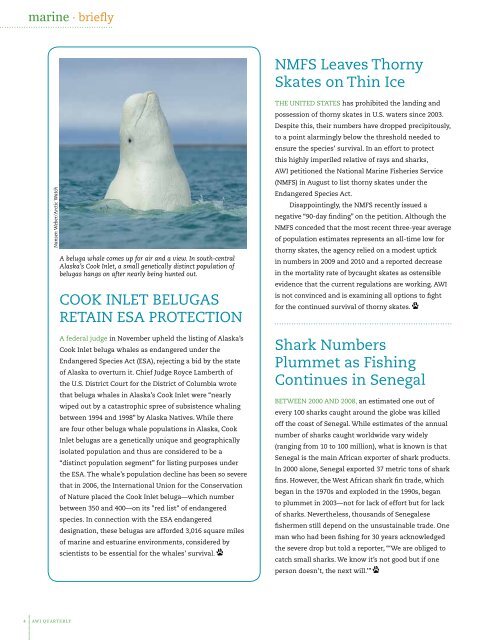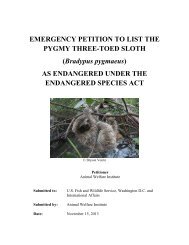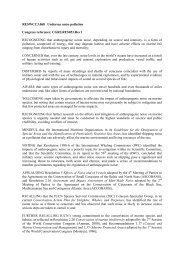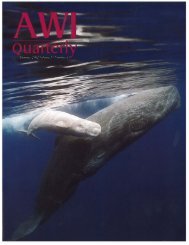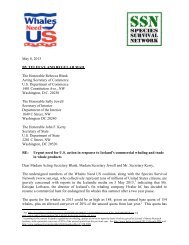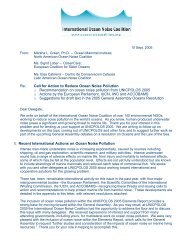Quarterly - Animal Welfare Institute
Quarterly - Animal Welfare Institute
Quarterly - Animal Welfare Institute
Create successful ePaper yourself
Turn your PDF publications into a flip-book with our unique Google optimized e-Paper software.
marine · briefly<br />
NMFS Leaves Thorny<br />
Skates on Thin Ice<br />
Nansen Weber/Arctic Watch<br />
A beluga whale comes up for air and a view. In south-central<br />
Alaska’s Cook Inlet, a small genetically distinct population of<br />
belugas hangs on after nearly being hunted out.<br />
Cook Inlet Belugas<br />
Retain ESA Protection<br />
A federal judge in November upheld the listing of Alaska’s<br />
Cook Inlet beluga whales as endangered under the<br />
Endangered Species Act (ESA), rejecting a bid by the state<br />
of Alaska to overturn it. Chief Judge Royce Lamberth of<br />
the U.S. District Court for the District of Columbia wrote<br />
that beluga whales in Alaska’s Cook Inlet were “nearly<br />
wiped out by a catastrophic spree of subsistence whaling<br />
between 1994 and 1998” by Alaska Natives. While there<br />
are four other beluga whale populations in Alaska, Cook<br />
Inlet belugas are a genetically unique and geographically<br />
isolated population and thus are considered to be a<br />
“distinct population segment” for listing purposes under<br />
the ESA. The whale’s population decline has been so severe<br />
that in 2006, the International Union for the Conservation<br />
of Nature placed the Cook Inlet beluga—which number<br />
between 350 and 400—on its "red list" of endangered<br />
species. In connection with the ESA endangered<br />
designation, these belugas are afforded 3,016 square miles<br />
of marine and estuarine environments, considered by<br />
scientists to be essential for the whales’ survival.<br />
The United States has prohibited the landing and<br />
possession of thorny skates in U.S. waters since 2003.<br />
Despite this, their numbers have dropped precipitously,<br />
to a point alarmingly below the threshold needed to<br />
ensure the species’ survival. In an effort to protect<br />
this highly imperiled relative of rays and sharks,<br />
AWI petitioned the National Marine Fisheries Service<br />
(NMFS) in August to list thorny skates under the<br />
Endangered Species Act.<br />
Disappointingly, the NMFS recently issued a<br />
negative “90-day finding” on the petition. Although the<br />
NMFS conceded that the most recent three-year average<br />
of population estimates represents an all-time low for<br />
thorny skates, the agency relied on a modest uptick<br />
in numbers in 2009 and 2010 and a reported decrease<br />
in the mortality rate of bycaught skates as ostensible<br />
evidence that the current regulations are working. AWI<br />
is not convinced and is examining all options to fight<br />
for the continued survival of thorny skates.<br />
Shark Numbers<br />
Plummet as Fishing<br />
Continues in Senegal<br />
Between 2000 and 2008, an estimated one out of<br />
every 100 sharks caught around the globe was killed<br />
off the coast of Senegal. While estimates of the annual<br />
number of sharks caught worldwide vary widely<br />
(ranging from 10 to 100 million), what is known is that<br />
Senegal is the main African exporter of shark products.<br />
In 2000 alone, Senegal exported 37 metric tons of shark<br />
fins. However, the West African shark fin trade, which<br />
began in the 1970s and exploded in the 1990s, began<br />
to plummet in 2003—not for lack of effort but for lack<br />
of sharks. Nevertheless, thousands of Senegalese<br />
fishermen still depend on the unsustainable trade. One<br />
man who had been fishing for 30 years acknowledged<br />
the severe drop but told a reporter, “‘We are obliged to<br />
catch small sharks. We know it’s not good but if one<br />
person doesn't, the next will.’”<br />
4<br />
AWI <strong>Quarterly</strong>


